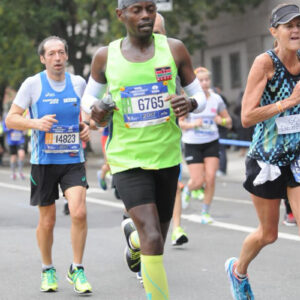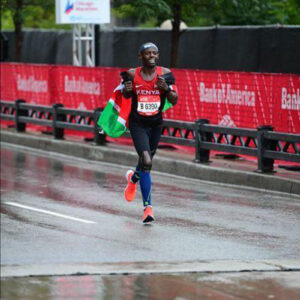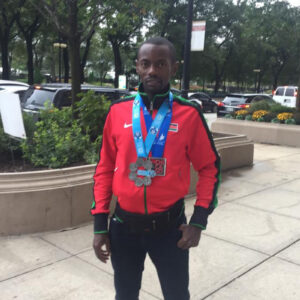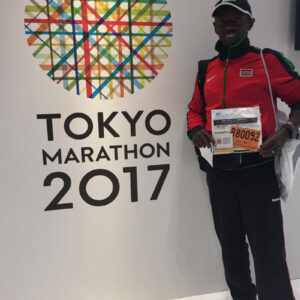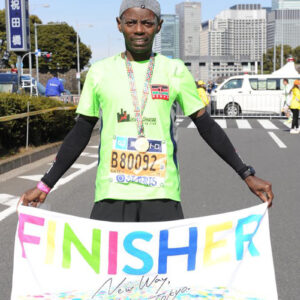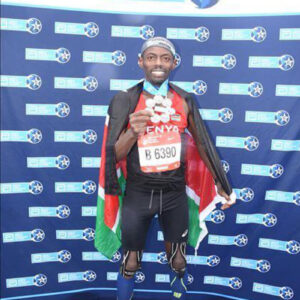Facebook
Linkedin
Twitter
Pinterest
WhatsApp
- How long have you been running and what led you to it?
I have been pretty much a runner though out my school life and into working years. However I only picked up serious long distance running about 8 years ago when I turned 40. My main motivation has always been fitness and fear of becoming ‘fat’ if I may use that word.Later on the prospects of touring the world as I run marathons has been my major motivator. Holidays and business travels must integrate with some run somewhere. - What set you on your Six Star Journey and what has been the motivation to pursue all 6 majors?
Back in 2015 when I run my first full marathon, I felt an urge to set sight on a journey that will push me to train harder and become fitter as I aged. I figured that since marathon running requires great commitment to training the World marathon Majors would be the best goal to keep me focused. - What was your first marathon major and what are some of the tough learnings that helped in you the subsequent 5 majors?
I started off with Berlin Marathon in 2016 as it was easier to get a slot through a London based sports Tour company. This also happened to set my goals higher because I was able to lower my previous time by 28 minutes. There was no going back. - How did you qualify and enter each of the races?
With my Berlin time of 3:20, I easily got a Tokyo Marathon (feb 2017) slot but still opted to use a Singapore based sports tour for logistical purposes. My goal in Tokyo was to get a Boston qualification time of 3:15. I barely scraped through with a time of 3:14 but good enough to get me a slot in Boston. Two Months later (April 2017) while nursing a shin splint injury I was at the start line of London Marathon running with Team St. John’s Ambulance who gave me slot through a fundraising commitment. London Marathon is about charity. Over half of the slots go to organisations which distribute them to interested runners who in turn raise money on their behalf. The catch is that there is a minimum commitment to raise 1500 pounds across the board. Later in the year I got a slot through the same London sports tour company to run the famous New York city marathon. By this time I was getting long distance running adaptability and despite having done two marathons earlier in the year, I managed a decent time of 3:01. Now, just one minute into sub-3 hours marathon got me charged. Boston was coming up in April 2018. I had about 4 months. I literally camped in Ngong. I had to enter the revered sub-3. Come April I was in top form but in a marathon anything can go wrong and no one has control. Boston Marathon 2018 was the worst weather the event had encountered since 1979. Temperatures of -1 degrees, snowing and hailstone rain. Runners suffered. To date I don’t even remember that journey. How I managed a PB of 2:58 still amazes me to date. All I recall was the cold especially at the finish line, such that, I had to be wheeled in a wheelchair to the heat and medical tent upon finishing. Despite all that I was determined to get my 6-star the same year 2018. Only Chicago marathon stood in the way. And Chicago did not disappoint. I didn’t care if I finished in 5 hrs. All that mattered was the six star crowning and with it came my PB of 2:42. - Which was the hardest race to get into?
Boston Marathon only considers time based qualification. A lot of runners get stuck in their six star pursuit when it gets to Boston. There are a few Charity based chances but they cost over 1 million Ksh. Its is the most prestigious having been in existence for over 100yrs. - What goes into planning for such races?
The races are expensive. Proper planning financially is key. Two One run qualifies you to the other so you have to know which one to start with and which one will be last. It also comes with a great commitment to training and with our busy schedules , one must find the time to train. - Describe to us what goes into training for these races?
If you are focused on the Majors, its important to structure your training differently from your regular Saturday club runs. The your you are the higher the qualification bar for these particular races. A big reason why you need to be well prepared is because the nature of big city marathons is that it’s a huge carnival and as you get to start line you wont just be running. You will be racing. If you are not well prepared at your level that is recipe for injury. Get a coach or just seniors in the recreational running who have some experience to guide you. For me I was trainng 5 days a week to a mileage of 80-100km. - Which was the hardest race to run and why?
Boston is the hardest. You need to have the time cut for your age. - What impact has this achievement made on your running?
Six stars sort of gave me the certificate to keep running for fitness as I encourage those close to me to do the same. Becoming a six star to some extent is prestigious in the recreational world. The journey towards attaining the stars is not easy and you come out of it a different person. You get to experience different cultures and meet and make friend all over the world. I made a decision to make my miles count when I embarked on the Majors. For every star I would donate an amount towards a course that makes a difference in the less fortunate. - Africa has so far produced only 90 six-star finishers, the lowest by continent, why do you think this is the case and what, in your opinion can be done to have more generals like you?
In Africa sports such as running are viewed as a job, a money making career, and its either you have the talent or you don’t. That perception keeps a lot of people away or doing minimal in sports. Its almost absurd to talk about paying for your own ticket to go run. Just to run? Folks start doing maths for you at how much you are wasting instead of securing a plot in Athi-river or any other place. What I can say is that recreational sports /running is gaining foot but at a slow pace. The point of contention is when you have to spend money. - South Africa has become Africa’s recreational running Powerhouse, what are some of your recommendations on how Kenya can catch up?
Kenya is catching up, slowly but surely. SA has been ahead for a long time. The government has a big role to play here. And I must say it is alsready doing that with the buiding of stadiums across the country. Private sector sponsorship towards running events will also go a long way.
